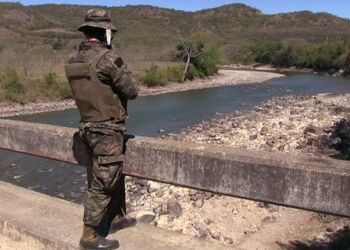El Salvador’s President Nayib Bukele has increased army operations along the country’s northern border with Honduras to combat transnational drug trafficking but this measure appears to overlook the primary entry points for cocaine.
In late October, Bukele ordered the Ministry of Defense to deploy more men and supplies to the towns of Arcatao, San Fernando, Nueva Trinidad and San Ignacio, in the northern department of Chalatenango that borders Honduras. He also wrote on Twitter, accusing the mayors of these municipalities of complicity with drug traffickers.
“It is evident that they try to smuggle drugs and contraband through there and that they have the support of local authorities,” the president tweeted, without offering any evidence.
However, as far as InSight Crime has been able to confirm during several field trips to the border areas of El Salvador and Honduras between 2019 and 2020, regional cocaine routes have never traditionally passed through those areas. In fact, a good part of the 23 tons of cocaine seized in El Salvador between 2017 and 2020, were caught transiting by sea, or to a lesser extent, via land routes far from the areas suggested by the president.
SEE ALSO: El Salvador News and Profiles
Since Bukele gave the order, the army has established five surveillance posts within the municipality of Arcatao alone, one of the most remote posts along the militarized border in Chalatenango, local mayor José Alberto Avelar told InSight Crime. “The army is still there… For now, they are doing nothing other than preventing locals from passing through,” he said.
To date, the government has not publicly reported results since the troops were deployed at the end of October to the northern part of Chalatenango, which borders the Honduran department of Lempira.
The northern part of Chalatenango has a long history of military occupations. In the 1980s, during the country’s civil war, it was an active operation center for guerrilla fighters. Its mountainous geography and the limited surveillance along its borders allowed for arms trafficking and the free movement of populations fleeing from the Salvadoran conflict.
Contraband smuggling, from livestock, basic grains to cigarettes and marijuana, has been common in the northern part of the department ever since, as it has supplied small domestic markets in the southern and western parts of Honduras.
InSight Crime Analysis
Since assuming power in June 2019, the Bukele administration has had little to show for its fight against drug trafficking. By the end of 2019, the country had only confiscated 99 kilograms of cocaine against 14 tons in 2018, according to data from the National Civil Police (Policía Nacional Civil – PNC).
The decision to militarize sections of a border through which cocaine rarely passes is unlikely to change this.
By early November 2020, the Salvadoran government has seized little more than two tons of cocaine, most of it in other areas of the country such as along the Pan-American highway and the eastern department of La Unión.
SEE ALSO: US Indictments Highlight Venezuela-Central America Drug Connections
Most of these drugs arrive in El Salvador by sea routes in the Pacific Gulf of Fonseca or pass through land border checkpoints at the Honduras border at El Amatillo without being detected. Yet, the Salvadoran government has not sent military reinforcements to these areas.
The mayors of the recently militarized towns in Chalatenango believe that the army’s presence is more politically motivated than it is to do with drug trafficking.
“I believe that it has to do with commitments that President Bukele has made to curb the flow of migrants,” Avelar, the mayor of Arcatao, told InSight Crime.

